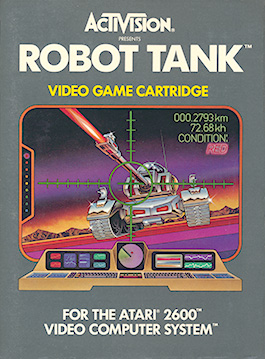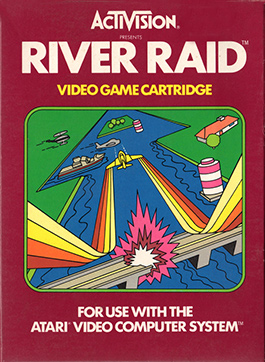
Kaboom! is an action video game published in 1981 by Activision for the Atari 2600. The game involves a Mad Bomber dropping bombs at increasing speeds as the player controls a set of water buckets to catch them. The gameplay was based on the Atari arcade video game Avalanche (1978). Kaboom! was programmed by Larry Kaplan with David Crane coding the graphics for the buckets and Mad Bomber. It was the last game designed by Kaplan for Activision, who left the company shortly after it was released. The game was later ported by Paul Wilson for the Atari 5200 system.

Berzerk is a video game designed by Alan McNeil and released for arcades in 1980 by Stern Electronics of Chicago. The game involves a Humanoid Intruder who has to escape maze-like rooms that are littered with robots that slowly move towards and shoot at the Humanoid. The player can shoot at the robots to try and escape the room. Along with the robots, a smiley face known as Evil Otto appears to hunt down the player within each room.

Pitfall! is a video game developed by David Crane for the Atari 2600 and released in 1982 by Activision. The player controls Pitfall Harry, who has a time limit of 20 minutes to seek treasure in a jungle. The game world is populated by enemies and hazards that variously cause the player to lose lives or points.

The TV Boy, and its successors TV Boy II and Super TV Boy, are handheld TV games sold by many different companies, including Systema, Akor, and NICS, based upon an unlicensed clone of Atari 2600 hardware. They were released around 1992 and three years later, an improved version of the TV Boy 2, the Super TV Boy, was also made by Akor. They were widely available across Europe. In the UK, they were most visibly available through Argos.

Imagic was an American video game developer and publisher that created games initially for the Atari 2600. Founded in 1981 by corporate alumni of Atari, Inc. and Mattel, its best-selling titles were Atlantis, Cosmic Ark, and Demon Attack. Imagic also released games for Intellivision, ColecoVision, Atari 8-bit computers, TI-99/4A, IBM PCjr, VIC-20, Commodore 64, TRS-80 Color Computer, and Magnavox Odyssey². Their Odyssey² ports of Demon Attack and Atlantis were the only third-party releases for that system in America. The company never recovered from the video game crash of 1983 and was liquidated in 1986.

Starmaster is a video game written for the Atari 2600 by Alan Miller and published in June 1982 by Activision. The game involves the player travelling through space attacking enemy starfighters who are invading starbases. The player traverses through a map called the galactic chart to destroy all the enemies and survive against oncoming enemy attacks and crashing with meteors.

Robot Tank is a first-person shoot 'em up written by Alan Miller for the Atari 2600 and published by Activision in 1983. It is similar in design to Atari, Inc.'s Battlezone tank combat arcade video game and more so to its 2600 port. Robot Tank adds different systems which can individually be damaged—instead of the vehicle always exploding upon being shot—and weather effects.

Chopper Command is a horizontally scrolling shooter released by Activision for the Atari 2600 in June 1982. It was written by Bob Whitehead. The player flies a helicopter left and right over a scrolling, wraparound landscape, shooting down enemy airplanes to protect a convoy of trucks below.

River Raid is a video game developed by Carol Shaw for the Atari Video Computer System and released in 1982 by Activision. The player controls a fighter jet over the River of No Return in a raid behind enemy lines. The goal is to navigate the flight by destroying enemy tankers, helicopters, fuel depots and bridges without running out of fuel or crashing.

Grand Prix is a Formula One Grand Prix motor racing-themed video game. It was designed and programmed by David Crane for the Atari 2600 and published by Activision in 1982.

Skeet Shoot is a skeet shooting video game for the Atari 2600 and the first game released by Games by Apollo in December 1981. Players assume the role of a skeet shooter shooting clay pigeons. There is a two-player mode where the players alternate.

Astro Chase is a multidirectional shooter written by Fernando Herrera for Atari 8-bit computers. It was published by First Star Software in 1982 as the company's first game. Parker Brothers licensed it, releasing cartridge versions for the Atari 8-bit family and Atari 5200 console in 1983 and a Commodore 64 version in 1984. Exidy licensed it for arcade use with its Max-A-Flex cabinet.

Megamania is a fixed shooter video game developed by Steve Cartwright for the Atari 2600. It was published by Activision in 1982. In the game, a pilot of an intergalactic space cruiser has a nightmare where his ship is being attacked by food and household objects. Using the missile launcher from their space cruiser, the pilot fends off the attackers. The game was later released for the Atari 5200 and Atari 8-bit computers.
Games by Apollo Inc. was a third-party developer of games for the Atari 2600 video game system, based in Richardson, Texas. It was founded in October 1981 by Pat Roper as a subsidiary of his National Career Consultants (NCC). Apollo's first title was Skeet Shoot, and neither it nor the ten games that followed caught on, and the company was one of the first to declare bankruptcy as a result of the video game crash of 1983.

Skiing is a video game cartridge for the Atari 2600. It was authored by Bob Whitehead and released by Activision in 1980. It is one of the first video games developed by Activision.

Assault is a 1983 fixed shooter video game developed and published by Bomb for the Atari 2600. Controlling a spaceship fixated at the bottom of the screen, gameplay involves the player shooting projectiles towards an enemy mothership that deploys smaller ships to attack the player. The player must also prevent enough projectiles from touching the bottom of the screen.

Necromancer is an action game created by Bill Williams for Atari 8-bit computers and published by Synapse Software in 1982. A port to the Commodore 64 followed in 1983. The game was rereleased by Atari Corporation on cartridge in the style of the Atari XEGS in 1987.

Lost Luggage is a 1982 action video game developed and published by Games by Apollo for the Atari 2600. The player controls skycaps working at an airport and tries to collect pieces of luggage that fall overhead from a frantic luggage carousel. A two-player mode, in which the second player controls the direction the luggage falls, is also available.

Dolphin is a side-scrolling video game created by Matthew Hubbard for the Atari 2600 and released by Activision in 1983. Dolphin requires the player to use audio cues in order to survive.

Bandits is a 1982 fixed shooter written by Tony and Benny Ngo for the Apple II and published by Sirius Software. The game is a clone of Taito's 1980 Stratovox arcade video game where the goal is to prevent aliens from stealing objects. Bandits was ported to the Atari 8-bit computers, Commodore 64, and VIC-20.




















